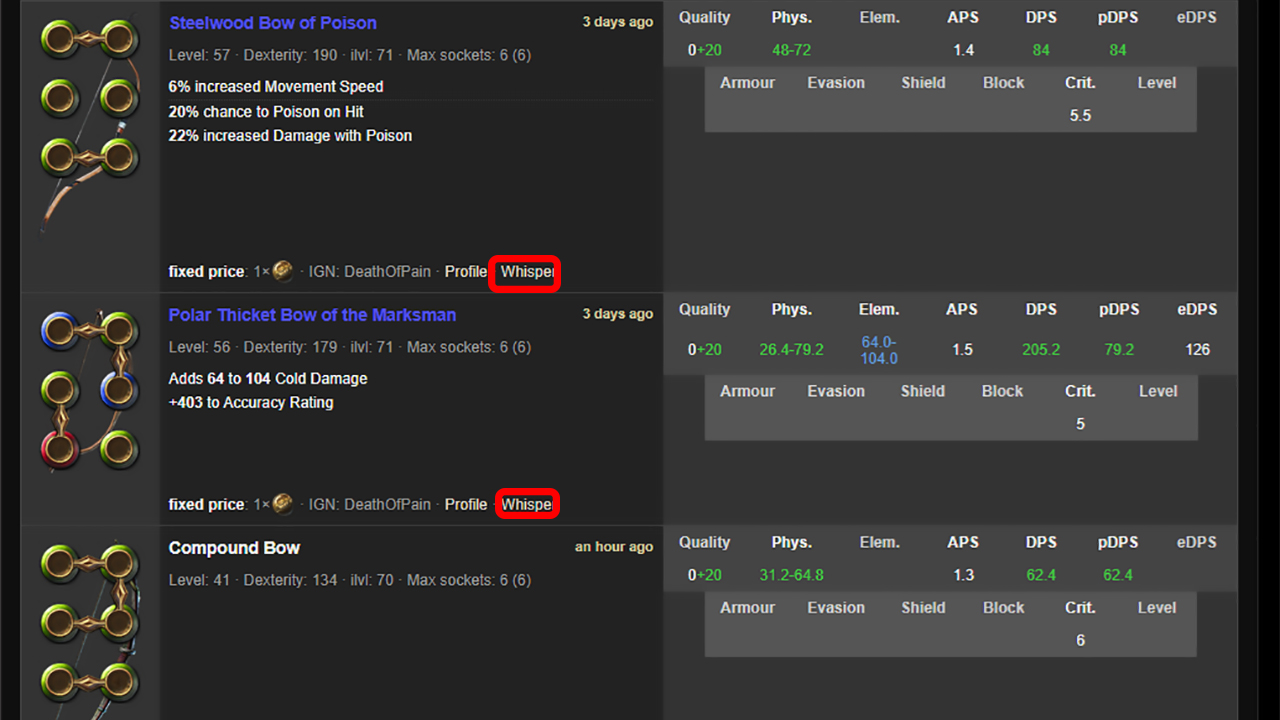How to trade with other players in Path of Exile
You've found all the best loot, now here's how to get rich from it.

In Path of Exile, trading items with other players is a whole other game in itself. Nearly every piece of loot you find while adventuring can be traded away, and if you know the right stuff to look for you can make an absolutely absurd amount of money. But what if you don't know how to trade in Path of Exile? Don't sweat it. This guide covers all the basics.
If you've just started playing, a big part of what makes Path of Exile cool is its complex bartering economy. Unlike, say, Diablo 3, there's no single currency like gold that you use to purchase items from NPC vendors or other players. Instead, trading in Path of Exile is done in a variety of currencies that also double as crafting resources. When you sell loot to a vendor, they'll also pay you in these currencies. It's a little bit complicated, but don't sweat it too much—before long, you'll start to get the hang of things.
How to trade in Path of Exile
Unlike other online RPGs, Path of Exile doesn't have any sort of in-game infrastructure to facilitate trading with other players. There's no auction house to browse, so the only way to trade is to physically find a person and manually start a trade with them. It's a pretty standard interface where you can each drag items from your inventory into the trade window, which requires both players to agree before the trade is finalized.
To find out what other players have for sale, use Poe.trade. This tool, built into Path of Exile's website, let's you search through items that other players have marked for sale.
Here's a quick rundown of how this process works:
- Use Poe.trade to find an item you're interested in.
- Click the 'whisper' button next to the seller's name.
- This copies a string of text you can then paste into the in-game chat window to automatically message a player saying you want to buy the item.
- Assuming that player is online, they'll message you back and typically invite you to their hideout to trade.
- Make sure to bring the currency with you in your inventory.
- At their hideout, complete the trade.
The below image shows where the whisper button is, since it's hard to find.

How to sell items in Path of Exile
This is a little bit trickier and will require you to also spend a little bit of money. In order to list items for sale and make them appear on Poe.trade, you need to have a premium stash tab. The chest found in every main hub and your hideout is your stash, and it normally comes with just four basic tabs (think of them like pages) for you to store loot in.
Keep up to date with the most important stories and the best deals, as picked by the PC Gamer team.
Premium tabs have a few extra features:
- They can be renamed.
- They can be colored (for easy organization).
- They can be set 'public' so that websites like Poe.trade can index the items stored there so it'll show up in search results and other players can buy it from you.
Don't worry, though, making a tab public doesn't mean anyone can come and take your items.
The video below is also an excellent guide to trading by YouTuber Engineering Eternity.
In Path of Exile's microtransaction shop, you'll find a category for stash tabs that offers a bunch of different tabs that suit various purposes. Some have special layouts for organizing your crafting items, maps, or other unique types of loot you might find. If you play Path of Exile seriously, it's worth investing in a few of these tabs.
Here are the two I recommend buying to start:
- Premium stash tab upgrade (15p) - This upgrades one of your regular stash tabs to a premium one.
- Currency stash tab (75p) - This adds a new tab with a special layout for storing different currencies. It's super helpful to have.
With your new premium tab, you can now right click it to set its color and also set it to public. You have two options for how to sell items:
- Set it so every item in the premium tab sells for the same price
- Set it so each item is priced individually
For now, you'll probably want to individually price your items since you only have one premium tab and the value of loot can vary wildly.
When you drop any gear into this premium tab, you can right click it and set its price, choosing how many of a certain type of crafting resource you want someone to pay for it. Then, assuming it's priced reasonably and is an item people actually want, other players will soon start messaging you.
What are the best items to sell in Path of Exile?
I could give a whole seminar on what items are worth selling to other players and which ones are worth dumping at an NPC vendor. There is no simple answer to this and items value can change wildly over the course of a patch. But there are some simple steps you can take to find out if an item might be worth some money.
Since Poe.trade lists all other people trying to sell that item, the first thing you can do is search for similar items to yours and see how much of a price they fetch. This works particularly well with Unique items (the ones with the brown names). But it's also important to remember that even two Uniques can have a wildly different value depending on the layout and color of their sockets and their overall item level. For example, if you find a Unique at level 13, it'll be vastly weaker than the same Unique found by someone who is level 80.
If your search doesn't return any results, cast a wider net before giving up. Use the advanced search to filter by the item's base type and pick a wider range of item levels to see other items that are similar but not exactly the same.
The above video by Engineering Eternity is a great resource that breaks down what items you should be looking for while playing. It doesn't tell you how much you can get for those items (since prices are shifting all the time), but it will help you understand what stats to look for on gear.
How does Path of Exile's currency work?
As I mentioned above, Path of Exile doesn't have a generic currency like gold used for trading. Instead, players barter using crafting materials. Called orbs, these each have a variety of effects that are useful for modifying items that, in turn, affects their overall value. However, the de facto standard (what you could think of as the equivalent of a dollar) is a Chaos Orb. These are relatively rare, but once you reach Path of Exile's endgame you can expect most transactions to require a certain amount of Chaos Orbs—so you should always hold onto them when you find one.
This website shows a breakdown of the major currencies and what the conversion rate is to other crafting currencies. As an example, right now you'd need around 160 Orbs of Alteration, which are super common, to get a single Chaos Orb. Path of Exile's rarest item, the Mirror of Kalandra, costs a whopping 48,300 Chaos Orbs.
When deciding on what items to sell, I'd say that unless you're guaranteed a Chaos Orb, it's probably not worth your time. Players certainly sell items for much less—and it's possible to make a fortune that way—but more casual players should be out exploring dungeons instead of trying to play the market, unless that's your thing of course.
With over 7 years of experience with in-depth feature reporting, Steven's mission is to chronicle the fascinating ways that games intersect our lives. Whether it's colossal in-game wars in an MMO, or long-haul truckers who turn to games to protect them from the loneliness of the open road, Steven tries to unearth PC gaming's greatest untold stories. His love of PC gaming started extremely early. Without money to spend, he spent an entire day watching the progress bar on a 25mb download of the Heroes of Might and Magic 2 demo that he then played for at least a hundred hours. It was a good demo.


